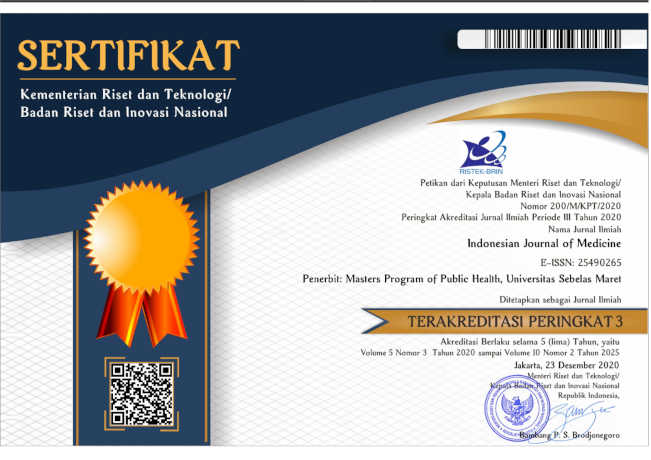Effect of Hypnobreastfeeding on Fatigue and Motivation to Breastfeed in Post Partum Mothers Starting on Day 3
DOI:
https://doi.org/10.26911/theijmed.2023.8.2.625Abstract
Background: Fatigue is a condition in which individuals feel tired and reduce their physical and mental abilities and will not go away with rest. Mothers with postpartum fatigue have a higher risk of stopping breastfeeding. This study aimed to analyze the effect of hypno-breastfeeding on maternal fatigue and motivation for breastfeeding post-partum mothers starting on the 3rd day in the working area of the Arjasa Health Center.
Subjects and Method: Research with a Pre-Experimental design was conducted at the Arjasa Health Center, Jember, East Java in January 2023. A total of 33 mothers were selected by cluster sampling. The dependent variable is the fatigue of the postpartum mother and the motivation for breastfeeding. The independent variable is the provision of hypno-breastfeeding. Data was collected using the PFS and BMIMS questionnaires. Data were analyzed using paired sample T-test.
Results: Mother's fatigue before (Mean= 51.60; SD= 16.73) was higher than after (Mean= 36.06; SD= 7.45) given hypno-breastfeeding and was statistically significant (p<0.001). Mothers' motivation in breastfeeding after being given hypno-breastfeeding treatment (Mean= 85.96; SD= 4.64) was higher than before (Mean= 68.80; SD= 14.66), and statistically significant (p<0.001).
Conclusion: Hypno-breastfeeding is effective in reducing fatigue and increasing motivation in breastfeeding post-partum mothers.
Keywords: hypno-breastfeeding, postpartum mothers, fatigue, breastfeeding motivation.
Correspondence: Ida Watna. Master's Program of Public Health, Strada Institute of Health Sciences, Indonesia. Jl. Manila No. 37, Tosaren, Kec. Islamic Boarding School, City of Kediri, East Java 64123. Email: danandeso79@gmail.com. Mobile: +62 823-3423-6376.
Indonesian Journal of Medicine (2023), 08(02): 150-156
https://doi.org/10.26911/theijmed.2023.08.02.04
References
Afifah DN (2007). Faktor yang berperan dalam kegagalan praktik pemberian asi eksklusif. ResearchGate. 1–19.
Bobak (2010). Buku ajar Keperawatan Maternitas, ECG: Jakarta.
Dewey KG (2001). Nutrition, growth, and complementary feeding of the breastfed infant. Pediatr. Clin. N. Am. 48(1): 87–104. Doi: 10.1016/S00313955.
DeJager E, Skouteris H, Broadbent J, Amir L, Mellor K (2013). Psychosocial correlates of exclusive breastfeeding: a systematic review. Midwifery. 29(5): 506–518. Doi: 10.1016/j.midw.2012.04.009.
Dunning MJ, Giallo R (keampuhan dan kepuasan pada ibu bayi dan anakanak. J Reprod. 30(2): 145–159.
Dyanti, Ratih, Kumorowulan S (2019). Pengaruh massage effleurage punggung dan hypnobreastfeeding terhadap kadar kortisol dan produksi asi pada ibu masa nifas. Poltekkes Kemenkes Semarang.
Hariandja ME (2002). Manajemen Sumber Daya Manusia. 1st edn. Edited by Y. Hardiawati. Jakarta: Grasindo.
Hughes O, Mohamad M, Doyle P, Burke G (2017). The significance of breastfeeding on sleep patterns during the first 48 hours postpartum for first-time mothers. J. Obstet. Gynaecol. Res. 38: 15. Doi: 10.1080/01443615.2017.1353594.
Kemenkes RI (2015b). Mari Dukung! Menyusui dan Bekerja. 1–6.
Mulder PJ (2006). A Concept Analysis of Effective Breastfeeding. J. Obstet. Gynecol. Neonatal Nurs. 35(3): 332–339. Doi: 10.1111/j.15526909.2006.00050.x.
Munoz C (2006). Postpartum Depression: Detection and Treatment in the Primary Care Setting. J Nurse Pract. 2(4): 247–253. Doi: 10.1016/j.nurpra.2006.02.008.
Sari LP, Salimo H, Budihastuti UR (2019). Hypnobreastfeeding Dapat Menurunkan Kecemasan Pada Ibu Post Partum. J. Keb. Kesh. Trad. 4(1): 20–27. Doi: 10.37341/jkkt.v4i1.95.
Sastrawinata S (2005). Obstetri Patologi. 2nd edn. Jakarta.
Smeltzer SC (2007). Pregnancy in Women with Physical Disabilities. JOGNN Clinical Issues. 36: 88–96. Doi: 10.1111/J.15526909.2006.00121.x.











